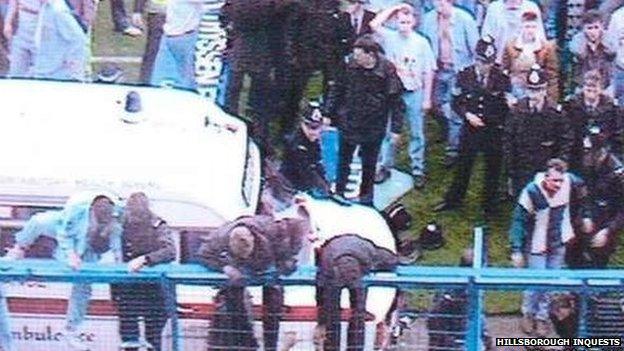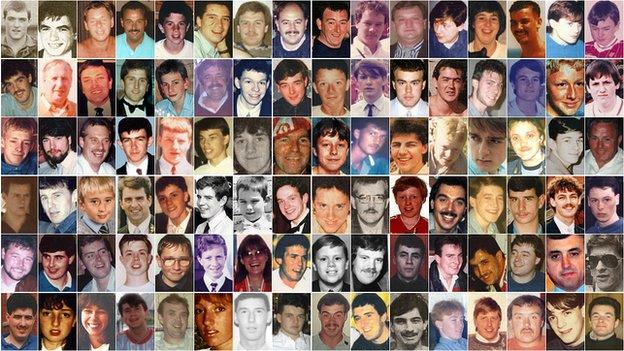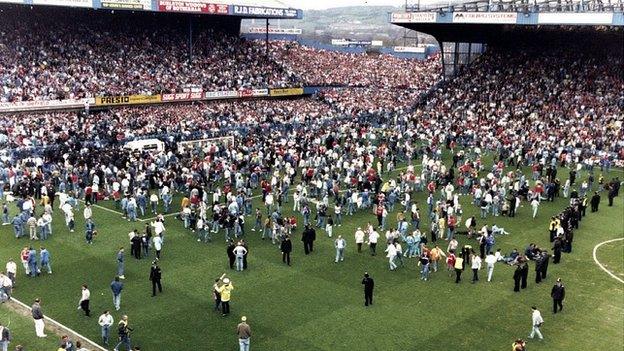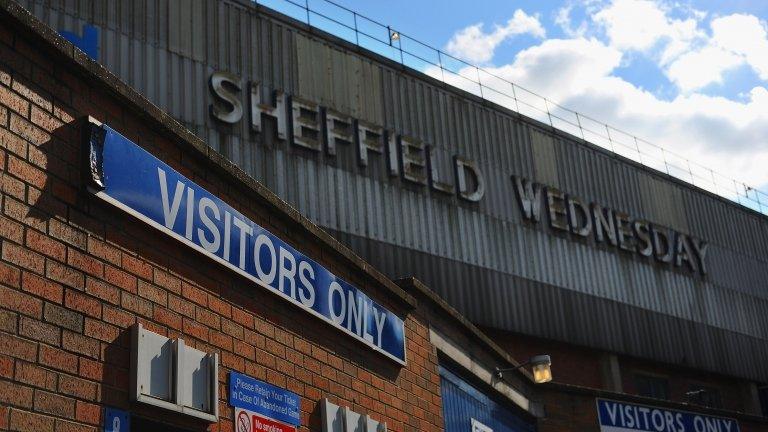Hillsborough inquests: Ambulances had 'bolt croppers' to cut terrace fences
- Published

Peter Litster said South Yorkshire ambulances had a "rescue kit" containing industrial bolt croppers
Ambulances carried "industrial bolt croppers" that could have cut through fences on the Hillsborough terraces, a medic has told the inquests.
Peter Litster, who helped save lives in the 1989 disaster, was continuing to give evidence at the inquests.
He said the bolt croppers could have "very easily" cut through the fences at the Leppings Lane end.
But a lawyer for the ambulance service said other medics believed they were not "industrial sized", the jury heard.
Ninety-six football fans died after being fatally injured in a crush at the 1989 FA Cup semi-final between Liverpool and Nottingham Forest at Sheffield Wednesday's stadium.
'Rescue box'
Mr Litster was a leading ambulance man with South Yorkshire Metropolitan Ambulance Service (SYMAS) when the disaster happened.
He told the jury ambulances in South Yorkshire carried a "rescue box" at the time, which included a "big set of industrial bolt croppers... which could cut through long steel".
He said they "would enable you to get though locked gates, to help get into a car and to get in through doors".
The croppers had levers that were "about two-and-a-half to three feet long", the jury heard.
Sean Horstead, a barrister representing a group of Hillsborough families, asked him if it would be self-evident during the disaster that those industrial bolt croppers would be of "incredible use".
Mr Litster agreed and said it would be "utterly fanciful" to suggest otherwise.
Jenni Richards QC, who represents the ambulance service, said the jury had heard from other ambulance service witnesses who said they were not large industrial sized bolt croppers and they would not cut through the fences so easily.
Mr Litster replied: "I believe we should have had some tests done to find out if they did or not."
Asked if he was claiming the other ambulance service witnesses were "incorrect", Mr Litster said: "I believe that they would have cut through quite easily, ma'am."
The jury had previously heard Mr Litster describe Assistant Chief Ambulance Officer David Jones as ineffective and a "headless chicken", which Ms Richards said was unfair and Mr Jones disputes.
Ms Richards said Mr Jones had had cause to discipline Mr Litster during his career, which the witness said he did not recall.
'Couldn't have coped'
Former PC Robert Washington has also given evidence at the inquests in Warrington.
He was part of a group of officers stationed at the back of the West Stand, which included the back of the turnstiles, an exit gate that was opened to allow in about 2,000 fans eight minutes before kick off, and a tunnel leading into the central pens.
He told the jury he believed there should have been more officers, known collectively as serials, stationed there.
He said: "If things would have turned... ugly, things had got difficult, I believe that we should have had a couple more serials there within the concourse.
"A serial of 10 people, I don't think, if things got out of hand, we could have coped."
His original statement also included: "I feel that at least two further serials should have been deployed in the area."
But that sentence was crossed out from a draft of his statement and did not appear in a final official version.

Who were the 96 victims?

BBC News: Profiles of all those who died

Mr Washington signed the final version but said he did not know until he was interviewed by the Independent Police Complaints Commission in 2013 that it had been changed, the court heard.
He said after a week of nights, on his return to a day shift after the disaster a plain clothes officer whom he did not know "introduced himself as being from the Hillsborough Inquiry and he had got a statement for me to sign".
Mr Washington said the officer told him all the statements had gone "via the force solicitor and anything inadmissible, or something like that, had been removed".
Asked what his reaction would have been if he had been told something had been removed, he said: "I would have refused to sign it... because I think that's a pertinent point that's been omitted."
Mr Washington also said it was "fair comment" that on the day of the disaster he and his colleagues were "let down... by senior officers".
He agreed they were "left to deal with this appalling situation without proper organisation and it was chaos".
The inquests continue.
- Published15 December 2014

- Published15 December 2014
